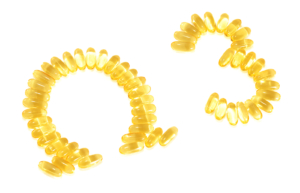Do Omega 3s Improve Performance or Health?
Omega 3’s: What are they and what do they do?
Fish oil is a polyunsaturated fat. It is found in the highest concentration in oily fish such as tuna, mackerel, and salmon.
Fish oil is a good source of omega- 3 fatty acids such as eicosapentaenoic acid (EPA), and docosahexaenoic acid (DHA). Omega-3’s have many potential health benefits, and this is due to the ability for omega-3’s to nurture cell membrane flexibility. Omega-3 fatty acids also influence enzymes and hormones throughout the body, and they are particularly beneficial for reducing inflammation.
Fish oil has shown improvements in:
- reducing triglycerides(1,9)
- reducing oxidative stress (3)
- reducing LDL cholesterol (4)
- improving body composition and cardiovascular disease risk factors (5)
Fish oil for performance
Fish oil supplements may be especially beneficial for athletes in terms of overall health, but as of now there is no long-term evidence to support fish oil supplementation having any effect on exercise performance.
However, omega-3 fatty acids have all shown evidence that supplementation has lowered heart rate(2) , reduced muscle soreness(6) in athletes. One study was able to conclude that acute dosing of high-EPA fish oil may improve the functional changes following EIMD (exercise-induced muscle damage)(7).
How much fish oil do I need?
There is no recognized standard for omega-3 supplementation, American Heart Association recommends 1g daily, but 2-3g are recommended for additional benefits. Supplement with caution: potential side effects of consuming too much fish oil or omega-3 fatty acids may include elevations in blood sugar in those with diabetes, low blood pressure, stroke and diarrhea to name a few. These side effects are especially important to consider if you are an athlete, because they could severely hinder your performance.
Not all fish oils are created equal! Be sure to look for dark colored containers containing triglyceride-form omega-3s. Your individual needs and goals will dictate how much EPA and DHA you should have in your supplement. Contact our qualified Registered Dietitians to get your needs and a recommendation from our professional brand online dispensary (please don’t order your supplements from Amazon!).
The OmegaCheck test
The OmegaCheck is a test is performed by Liquid Chromatography-Tandem Mass Spectrometry, and measures specific lab values of three important omega-3 fatty acids- EPA, DHA, DPA in the blood. For this specific lab test, a high number is ideal as it reflects the overall intake of these three fatty acids in the diet.
OmegaCheck will additionally report the ratio of omega-6 to omega-3 fatty acids. The ideal ratio of omega-6 to omega-3 is 2:1. The AA (arachidonic acid):EPA ratio is also included in the OmegaCheck numbers. This details the ratio of inflammatory to non inflammatory fatty acids present. An increased ratio can contribute to certain disease states such as depression, diabetes, and auto-immune diseases(8).
Are Omega-3s appropriate for you? We can help!
Book your FREE Nutrition Consultation today!
References:
- Zulyniak, M. A., Perreault, M., Gerling, C., Spriet, L. L., & Mutch, D. M. (2013, August). Fish oil supplementation alters circulating eicosanoid concentrations in young healthy men. Retrieved from https://www.ncbi.nlm.nih.gov/pubmed/23522836
- Buckley JD, Burgess S, Murphy KJ, Howe PR. DHA-rich fish oil lowers heart rate during submaximal exercise in elite Australian Rules footballers. Retrieved from https://www.ncbi.nlm.nih.gov/pubmed/18555744
- Filaire E, Massart A, Portier H, Rouveix M, Rosado F, Bage AS, Gobert M, Durand D. Effect of 6 Weeks of n-3 fatty-acid supplementation on oxidative stress in Judo athletes. Retrieved from https://www.ncbi.nlm.nih.gov/pubmed/21116022
- Warner JG Jr, Ullrich IH, Albrink MJ, Yeater RA. Combined effects of aerobic exercise and omega-3 fatty acids in hyperlipidemic persons. Retrieved from https://www.ncbi.nlm.nih.gov/pubmed/2691812
- Hill AM, Buckley JD, Murphy KJ, Howe PR. Combining fish-oil supplements with regular aerobic exercise improves body composition and cardiovascular disease risk factors. Retrieved from https://www.ncbi.nlm.nih.gov/pubmed/17490962
- Black KE, Witard OC, Baker D, Healey P, Lewis V, Tavares F,, Christensen S, Pease T, Smith B,.Adding omega-3 fatty acids to a protein-based supplement during pre-season training results in reduced muscle soreness and the better maintenance of explosive power in professional Rugby Union players. Retrieved from https://www.ncbi.nlm.nih.gov/pubmed/29985775
- Jakeman JR, Lambrick DM, Wooley B, Babraj JA, Faulkner JA. Effect of an acute dose of omega-3 fish oil following exercise-induced muscle damage. Retrieved from https://www.ncbi.nlm.nih.gov/pubmed/2821375
- https://www.dropbox.com/s/sr91fj9xmbzl6e1/OmegaCheck%20Clinical%20Applications.pdf?dl=0
- Poprzecki S, Zajac A, Chalimoniuk M, Waskiewicz Z, Langfort J. Modification of blood antioxidant status and lipid profile in response to high-intensity endurance exercise after low doses of omega-3 polyunsaturated fatty acids supplementation in healthy volunteers. Retrieved from https://www.ncbi.nlm.nih.gov/pubmed/19468948
Thanks to Elisabetta Ballaben DTR, Dietetic Intern with Be Well Solutions. Her professional interests include plant-based nutrition, nutritional psychology, and women’s health.




